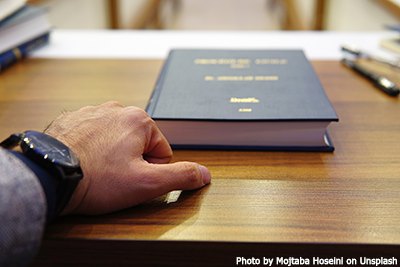
Introducing a New Document Called
“Notice of Discrepancy”
By: Atty. Rodel C. Unciano
"In essence, the ND is similar to the NIC as it gives the taxpayer an opportunity to present and explain his side on the discrepancies noted by the BIR within 30 days from the taxpayer’s receipt of the ND. Similar to the NIC, the ND should be in writing, should state the Revenue Officer’s initial report of his findings of discrepancies, and should give the taxpayer an opportunity for discussion on the noted discrepancies. Similar to the NIC, the ND must be issued to taxpayers under investigation to notify and invite them for discussion of the BIR’s initial findings. This is part of due process requirement afforded to taxpayers before issuance of deficiency tax assessment, if warranted."
The 1987 Philippine Constitution guarantees that no person shall be deprived of life, liberty, or property without due process of law. In line with this constitutional mandate, the 1997 Tax Code guarantees due process rights of taxpayer’s in tax investigation cases. Thus, the Tax Code requires that when the Commissioner or his duly authorized representative finds that proper taxes should be assessed, he shall first notify the taxpayer of his findings, except only in few instances where a preassessment notice is not required.
 Consistent with the above mandate of the Constitution and of the Tax Code, the Department of Finance (DOF) issued on September 6, 1999 Revenue Regulations (RR) No. 12-99, prescribing among others, the due process requirements in tax investigation cases. It prescribed the issuance of Notice for Informal Conference (NIC) and Preliminary Assessment Notice (PAN) prior to the issuance of Formal Letter of Demand (FLD) and Assessment Notices.
Consistent with the above mandate of the Constitution and of the Tax Code, the Department of Finance (DOF) issued on September 6, 1999 Revenue Regulations (RR) No. 12-99, prescribing among others, the due process requirements in tax investigation cases. It prescribed the issuance of Notice for Informal Conference (NIC) and Preliminary Assessment Notice (PAN) prior to the issuance of Formal Letter of Demand (FLD) and Assessment Notices.
Note that it is the FLD that will become final, executory and demandable if taxpayer fails to respond within the time prescribed under the rules. Taxpayer’s failure to respond to the NIC or PAN will not render the assessment final, executory and demandable. The NIC and the PAN are actually advance notice to taxpayers that a tax assessment is forthcoming. This is part of taxpayer’s rights to due process before issuance of FLD, if warranted.
Thus, if the BIR finds that a taxpayer is liable for deficiency tax or taxes, it shall first notify the taxpayer of the noted tax deficiencies and give the taxpayer an opportunity to present his side of the case. Under RR 12-99, the taxpayer must be able to respond to the NIC within a period of 15 days from the taxpayer’s receipt of the NIC. Otherwise, the taxpayer shall be considered in default, paving the way for the BIR’s issuance of PAN.
More than ten years thereafter, the DOF issued RR 18-2013 amending the due process requirement in the issuance of deficiency tax assessment. Specifically, it deleted the requirement on the issuance of NIC but retained the requirement on issuance of PAN as a pre-requisite on issuance of FLD. Then, on January 22, 2018, the DOF, under RR 7-2018, reinstated the requirement on the BIR’s issuance of NIC. It even extended the period within which to conduct informal conference with the taxpayer to 30 days, from the original requirement of 15 days previously prescribed under RR 12-99.
Just recently, a new regulation was issued amending the rules one more time. Under RR 22-2020, the DOF again deleted the issuance of NIC as part of due process requirement in tax investigation cases. However, in lieu of the NIC, the BIR is now required to prepare and issue a document called Notice of Discrepancy (ND), instead of a NIC.
And so, what’s new in the ND as prescribed under RR-2020?
In essence, the ND is similar to the NIC as it gives the taxpayer an opportunity to present and explain his side on the discrepancies noted by the BIR within 30 days from the taxpayer’s receipt of the ND. Similar to the NIC, the ND should be in writing, should state the Revenue Officer’s initial report of his findings of discrepancies, and should give the taxpayer an opportunity for discussion on the noted discrepancies. Similar to the NIC, the ND must be issued to taxpayers under investigation to notify and invite them for discussion of the BIR’s initial findings. This is part of due process requirement afforded to taxpayers before issuance of deficiency tax assessment, if warranted.
within 30 days from the taxpayer’s receipt of the ND. Similar to the NIC, the ND should be in writing, should state the Revenue Officer’s initial report of his findings of discrepancies, and should give the taxpayer an opportunity for discussion on the noted discrepancies. Similar to the NIC, the ND must be issued to taxpayers under investigation to notify and invite them for discussion of the BIR’s initial findings. This is part of due process requirement afforded to taxpayers before issuance of deficiency tax assessment, if warranted.
What’s new perhaps in the new rule is the requirement for submission of supporting documents during the discussion or in case the taxpayer needs more time to submit documents after the discussion, the taxpayer must submit all necessary documents that support his explanation within thirty (30) days after receipt of the ND. This is expressly provided in RR 22-2020. There is no similar provision on this under RR 7-2018. But of course, even if no requirement for submission of supporting documents was expressly provided under the old rule, common sense dictates that supporting documents must also be submitted during the discussion to fully ventilate the taxpayer’s position.
The discussion of discrepancy under RR 22-2020 should be conducted within 30 days from the taxpayer’s receipt of the ND. If the investigating office still finds the taxpayer liable for deficiency taxes, it shall endorse the case to the reviewing office for issuance of deficiency assessment in the form of PAN within ten (10) days from the conclusion of the discussion. There is likewise similar provision on this under RR 7-2018 but the period has been extended from seven (7) days under RR 7-2018 to ten (10) days under RR 22-2020.
Tax rules do change over time. But whatever reason are behind these changes, taxpayer’s rights to due process should remain a paramount consideration.
The author is a partner of Du-Baladad and Associates Law Offices (BDB Law), a member-firm of WTS Global.
The article is for general information only and is not intended, nor should be construed as a substitute for tax, legal or financial advice on any specific matter. Applicability of this article to any actual or particular tax or legal issue should be supported therefore by a professional study or advice. If you have any comments or questions concerning the article, you may e-mail the author at This email address is being protected from spambots. You need JavaScript enabled to view it. or call 8403-2001 local 140.



